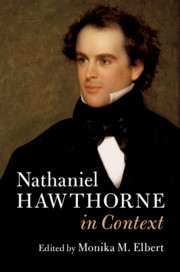Book contents
- Nathaniel Hawthorne in Context
- Nathaniel Hawthorne in Context
- Copyright page
- Dedication
- Contents
- Illustrations
- Notes on Contributors
- Abbreviations
- Introduction
- Part I Hawthorne and History
- Part II Popular Culture and Social Movements
- Chapter 9 Utopianism
- Chapter 10 Mesmerism and Other Pseudo-Sciences
- Chapter 11 Hawthorne and the City
- Chapter 12 Gender Roles
- Chapter 13 Melodrama and Drama
- Chapter 14 Hawthorne and the Visual Arts
- Chapter 15 The Scarlet Letter in Film
- Part III Hawthorne and the Literary Marketplace
- Part IV Hawthorne and Literary Traditions
- Part V Family and Place
- Further Reading
- Index
- References
Chapter 13 - Melodrama and Drama
from Part II - Popular Culture and Social Movements
Published online by Cambridge University Press: 26 November 2018
- Nathaniel Hawthorne in Context
- Nathaniel Hawthorne in Context
- Copyright page
- Dedication
- Contents
- Illustrations
- Notes on Contributors
- Abbreviations
- Introduction
- Part I Hawthorne and History
- Part II Popular Culture and Social Movements
- Chapter 9 Utopianism
- Chapter 10 Mesmerism and Other Pseudo-Sciences
- Chapter 11 Hawthorne and the City
- Chapter 12 Gender Roles
- Chapter 13 Melodrama and Drama
- Chapter 14 Hawthorne and the Visual Arts
- Chapter 15 The Scarlet Letter in Film
- Part III Hawthorne and the Literary Marketplace
- Part IV Hawthorne and Literary Traditions
- Part V Family and Place
- Further Reading
- Index
- References
- Type
- Chapter
- Information
- Nathaniel Hawthorne in Context , pp. 157 - 166Publisher: Cambridge University PressPrint publication year: 2018



